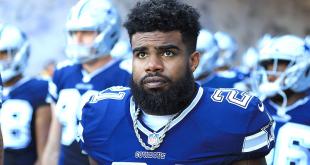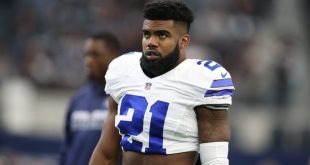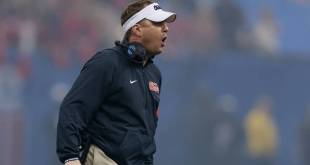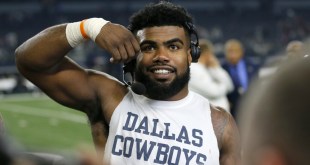The Ezekiel Elliott case is the latest in a long line of contentious NFL player discipline cases. For the background and explanation of the NFLPA’s lawsuit on behalf of Elliott, read this informative piece by John Sigety. I’ll pick up where he left off, explaining what has happened in a whirlwind two days and what to expect next in Elliott’s case.
The NFL Responds
On September 4, 2017, the eve of the scheduled injunction hearing, which the NFLPA requested in the Eastern District of Texas, the NFL filed a motion to dismiss the NFLPA’s suit and a memo in opposition to the NFLPA’s request for an injunction. I will address the motion to dismiss later as it relates to a future stage of the case.
In its opposition to the NFLPA’s injunction request, the NFL argued that the court lacked jurisdiction to enjoin (i.e. issue an injunction) a potential arbitration award. Jurisdiction is a court’s power to decide a case. If a court doesn’t have jurisdiction, it has no authority to rule on a suit. Basically, because no arbitration decision had been made when the NFLPA filed suit, the NFL argued the court had no power to enjoin a non-existent decision. Now that arbitrator Harold Henderson has upheld Elliott’s suspension, this argument is significantly weaker. The NFL will argue that jurisdiction must exist at the commencement of the suit. The NFLPA will seek to amend its suit to include specifics related to the arbitration decision and argue that its amendment relates back to the time of filing, a legal tactic by which the court treats later filed allegations as if they were filed on the same date as the original filing.
The main part of the NFL’s opposition is that the NFLPA cannot satisfy the legal requirements needed for a court to grant an injunction. The two most important things the NFLPA needs to show are a substantial likelihood of success on the merits and that Elliott will suffer irreparable harm if an injunction is not granted.
First, the NFL relies on the same arguments as it did in Deflategate to claim the NFLPA is unlikely to succeed on the merits: generally, as long as an arbitrator is even arguably construing the CBA, courts will not overturn his decision. The league also argued that the NFLPA’s claims of fundamental unfairness were overblown. Though investigator Kia Roberts’s conclusion to not suspend Elliott may have never been presented to NFL Commissioner Roger Goodell, the evidence and facts underlying her decision were all included in the investigative report presented to him. Additionally, in response to the NFLPA’s argument that Henderson should have compelled testimony from Goodell or from Elliott’s ex-girlfriend, Tiffany Thompson, the league argued the CBA places the power to determine appropriate testimony within the sole discretion of the arbitrator.
Second, the NFL argued that the NFLPA fails the irreparable harm requirement because irreparable harm requires showing some harm that cannot be compensated by money. So if the only harm to Elliott is losing paychecks, that is not irreparable harm.
Just hours before the injunction hearing, the NFLPA filed a brief reply to the NFL’s arguments arguing it is likely to succeed on the merits. It also tries to shift the ground for when jurisdiction exists by arguing that suits may proceed when there are no more arbitral proceedings left to exhaust. As the union put it, “Injunctions are issued when the bulldozer is on the front lawn—not after it has razed the house.” This argument is made stronger now that Henderson has affirmed the suspension. The NFLPA will undoubtedly amend its initial request arguing that the court clearly has jurisdiction now and should proceed with the case.
Henderson’s Arbitration Decision
Although it would not have been surprising had Henderson taken longer to issue a decision, apparently he informed the parties that he would have his decision completed by the close of business on September 5, 2017, the same day as the injunction hearing. But as the day progressed, reports revealed that Henderson might not finish his decision before the hearing. In a scene out of a legal television drama, Henderson released his decision to uphold Elliott’s six-game suspension as the hours-long injunction hearing was drawing to a close. NFLPA attorney Jeffrey Kessler announced the decision to the court minutes before arguments ended.
Henderson did not find it unusual that the investigator’s recommendation was not provided to Goodell. Instead, he found that this fit the NFL Personal Conduct Policy’s new disciplinary investigation process, whereby the investigator’s role is to provide a report with findings, while the ultimate conclusion is left for Goodell to make. Henderson repeatedly emphasized the league’s adherence to the Personal Conduct Policy, saying it was “followed meticulously” and describing the process as “a carefully thought out, detailed, multi-faceted process which was adhered to closely.” Regarding the NFL’s first significant case under the policy, he claimed “they got it right.” In the end, Henderson found that the decisions made in the disciplinary process were fair and consistent “in every respect” with Goodell’s authority under the CBA.
The Injunction Hearing and What’s Next
Around 5:00p.m. Central Time on September 5, 2017, Judge Amos Mazzant heard the arguments in favor of and against granting an injunction. He advised the parties that he would be taking the decision under advisement and planned to render a decision by 5:00p.m. on Friday, September 8, 2017. Because Henderson’s decision was not released in time for the parties or the judge to review it, Judge Mazzant has allowed both sides to submit additional briefing by 5:00p.m. on September 6, 2017.
At the hearing, the NFL conceded that, due to the late release of the decision and the pending litigation, Elliott will be allowed to play on Sunday, September 10, 2017, in the Cowboys’ first game of the season against the New York Giants. This was done in deference to the judge’s request to have additional time to make his decision. If Judge Mazzant denies the NFLPA’s request for an injunction on Friday, Elliott will begin to serve his six-game suspension in Week 2 of the season. If Mazzant does deny the injunction, I would expect the NFLPA to immediately appeal to the Fifth Circuit Court of Appeals and to seek a stay of Mazzant’s decision.
If Mazzant grants the injunction request, you can expect the NFL to appeal the ruling to the Fifth Circuit as well. That would also mean Elliott would be able to play for the Cowboys until his case is resolved, unless the Fifth Circuit issues a stay of the injunction pending appeal. In addition to appealing any injunction, the NFL will also request that the judge grant its motion to dismiss, filed on September 4, 2017.
The NFL’s motion to dismiss argues mainly that the court lacks jurisdiction and the NFLPA lacks standing to bring the case. Standing is the ability of a party to file a lawsuit. Both of these arguments relied upon the fact that the NFLPA filed suit before an arbitration decision was made. In fact, since Henderson’s decision was released, the NFL has filed suit in the Southern District of New York to confirm his decision. The suit is nearly identical to the league’s Deflategate lawsuit filed in the same jurisdiction.
Once the union amends its filings in the Texas lawsuit and responds to the league’s motion to dismiss, Judge Mazzant will need to decide whether to keep the lawsuit or dismiss it. If he denies the motion to dismiss, it will be up to Judge Katherine Polk Failla in New York to determine whether to keep the case or transfer it to Texas as the first filed case. The judge could do this on her own motion, though she may wait for the NFLPA to at least make its arguments in this regard.
Henderson’s decision comports precisely with what one would expect the Fifth Circuit to rule in this case. It is geared clearly toward a court that is attentive to the legal precedents favoring arbitration generally and the NFL’s collectively bargained process specifically. But based on the reports about Judge Mazzant’s questions at oral arguments, it appears Elliott may have an advantage at the district court level.
Regardless of what happens, we are in for a long legal battle to come. If the NFL loses at the district court level, it will appeal to the Fifth Circuit, hoping for a similar result as in Deflategate, adding another circuit to its list of precedents protecting the expansive power of the commissioner. If the NFLPA loses, it will seek reversal from the Fifth Circuit too, though its chances of success are slim in the most conservative circuit in the country. In either case, the appeal will likely drag on for months, even if expedited, and the parties will be running from court to court to argue each step of the way.
 The Sports Esquires Putting Sports on Trial
The Sports Esquires Putting Sports on Trial





2 comments
Pingback: What to Read to Understand the Ezekiel Elliott Case - The Sports Esquires
Pingback: Ezekiel Elliott: Abuse, Suspensions and Lawsuits - A Sip of Sports